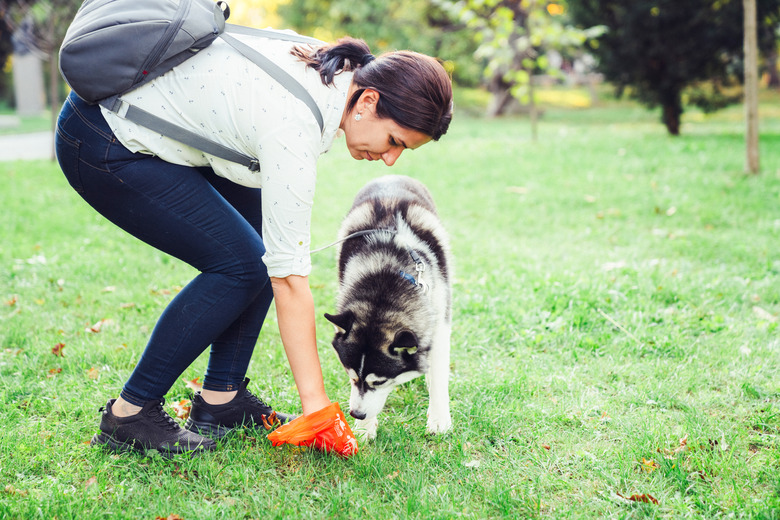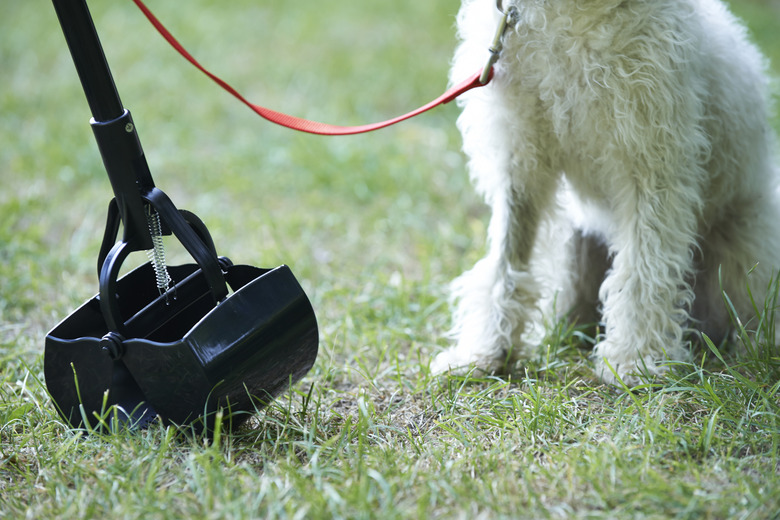What Causes Yellow Stool In Dogs?
Staring at dog poo probably isn't on your list of ways to have a good time, but it's important that you do it from time to time. While you certainly don't need to grab a magnifying glass and perform a lengthy study of your dog's feces, you should take note of its color. There are a few health issues that can cause yellowish poop, some of which require a little help from your vet. Others issues will resolve themselves.
My dog ate something he can't digest!
My dog ate something he can't digest!
Sometimes, our pets eat things they shouldn't. If your dog eats something he can't digest, it's likely to come out much the same color it was when it went in. Yellow feces isn't a cause for concern if your dog, for example, ate some yellow crayons or got into some yellow chalk. As long as your dog isn't showing any signs of intestinal blockage, your dog will pass his yellow snack in yellow stool, and things will return to normal in a day or so.
You will need to see your vet, however, if your dog ate something he shouldn't have and is having trouble passing it. Signs of bowel obstruction include vomiting, bloating, dehydration, weakness, diarrhea, and loss of appetite. If your dog shows these symptoms, get him to the vet right away, especially if you know he ate something he shouldn't have eaten.
Yellow mucus in dog stool
Yellow mucus in dog stool
Just like people, dogs can suffer from indigestion and upset stomach. If your dog ate something that's just not agreeing with her the evidence may show in her stool. Dogs with an upset stomach often expel large amounts of mucus with their feces, changing its appearance to foamy or slimy and creating white or yellow stools. Any change in a dog's stools may indicate problems with digestion.
Yellow poop in a dog caused by an upset stomach isn't a cause for alarm and should fix itself. If you notice yellow feces after changing your dog to a new food, something in her new diet may have caused the problem. Try switching her back to her old food and see if things return to normal.
Liver disease yellowing in dogs
Liver disease yellowing in dogs
When a dog is experiencing some type of liver disease or issue, it can cause his skin, eyes, ears, and gums to develop a yellowish hue. This jaundice won't usually make his feces yellow, but it can turn it a darker, reddish-brown color. If your dog's poo isn't quite the right color, and you notice signs of jaundice, see your vet right away. Other signs of liver issues include vomiting, weight loss, excessive thirst, confusion, frequent urination, and seizures.
If your vet suspects liver disease, he may run several tests to confirm the cause of the issue. Liver problems are often treatable and may simply involve changing your pet's diet or giving him some medication. If the issue is caused by a tumor, a vet can sometimes perform surgery to remove it.
Problems with the gallbladder in dogs
Problems with the gallbladder in dogs
Rarely, yellow dog poop can indicate gallbladder problems. Your dog's gallbladder is where she makes the bile that aids in digestion. If the gallbladder becomes blocked by a stone, hardened bile, or a tumor, the bile may not get where it needs to go. Instead, your dog may expel it along with her feces, giving her stool a yellow hue. Like liver problems, gallbladder issues can also turn the eyes and skin yellow.
In most cases, vets can treat gallbladder problems with routine surgery to remove the gallstones or other blockages. Afterward, your dog will regain her health and normal fecal color.
Irritable bowel syndrome in dogs
Irritable bowel syndrome in dogs
Yellow diarrhea in dogs can be a sign of irritable bowel syndrome (IBS) or inflammatory bowl disease (IBD). Both illnesses are common and may result in loose yellow stools. Though IBD and IBS can share similar symptoms, IBS is routinely triggered by stress and results in sudden loose stools while IBD may also be accompanied by weight loss or vomiting.
Science doesn't yet fully understand the causes of IBD or IBS in dogs or humans, but a vet can diagnose these conditions by ruling out other common causes of gastric upset, such as diet issues or parasites. Successful treatments include dietary changes and stress reduction. Your vet will likely recommend a high-fiber diet for your dog, and this is often all it takes to resolve the problem.

